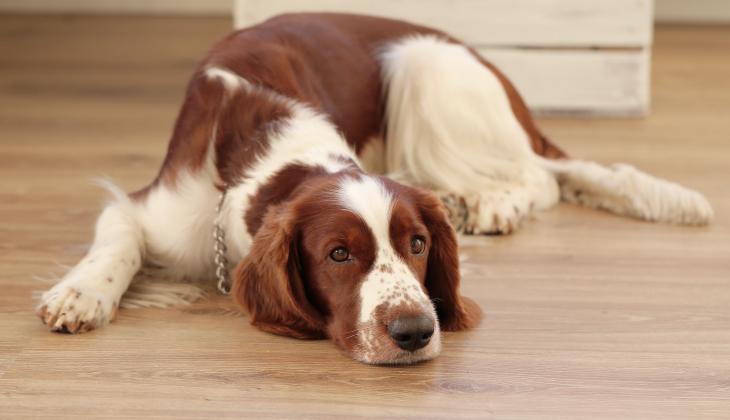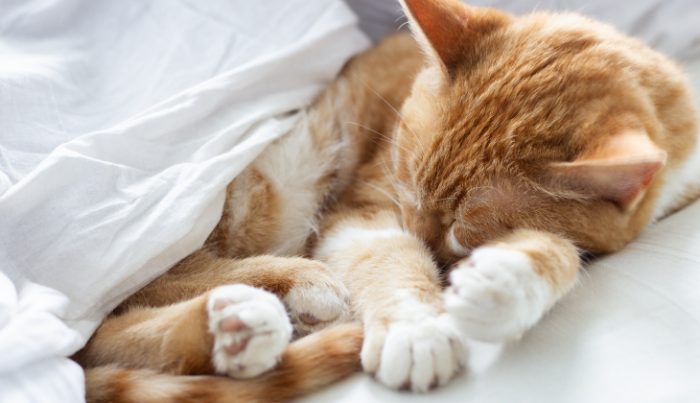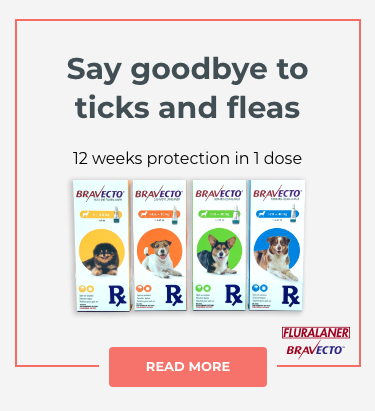What parasite is lurking in your pets’ intestine? Is it Giardia?
HEALTH & PROTECTION
6 Oct, 2021
5 minutes

Giardia parasite
If you’ve ever traveled or gone camping and have come down with a nasty case of diarrhea, there is a chance you contracted a common intestinal infection known as Giardia. This same infection is also common in your pets. But before you reach for any over-the-counter remedies, there are some important facts you should know about Giardiasis and your cat or dog.
WHAT IS GIARDIA?
Giardiasis is caused by a microscopic protozoan parasite called Giardia duodenalis. Giardia is not a worm, a bacteria or a virus – it is a simple one-celled parasitic species and it is prevalent worldwide.
The Giardia organism has two forms. The first is a feeding form, known as the trophozoite, which exists in the gut of infected animals. The second form is a solid cyst, which is shed through the feces and can survive for several months, especially in water and damp environments.
HOW DO DOGS AND CATS GET GIARDIASIS?
An animal becomes infected with Giardia by ingesting the infectious cysts that are shed in another animal’s feces. Once ingested, the cyst passes through the animal’s intestines where it goes through a transformation, turning into the feeding form (trophozoite), and attaching to the intestinal wall to feed. Trophozoites reproduce by dividing and some shed off in the cystic form, exiting the host body through the stool. The time it takes from ingestion of cysts to passage in feces is 5 to 12 days in dogs, and 5 to 16 days in cats.
Cysts are immediately able to infect another animal. Giardiasis is common in environments that are densely populated, such as kennels, pet stores or animal shelters. Animals become infected when they come into contact with infected feces from another dog or cat and this is usually by rolling or playing in contaminated soil, licking its body after contact with a contaminated surface, or drinking water from a contaminated creek, pond or other body of water.

WHAT ARE SYMPTOMS OF GIARDIASIS?
In general, it is less common for cats to become infected with Girardia than dogs. One study estimates that up to 50% of puppies will become infected with Giardiasis and up to 100% of dogs in kennels become infected, due to the close proximity in which they are sheltered.
Because these microscopic parasites attach themselves to the intestinal wall, reaction in your pet can be an acute, sudden onset of foul-smelling diarrhea. Giardia infection can also lead to weight loss, chronic intermittent diarrhea and fatty stool. Infected animals also tend to have mucus in their stool. Vomiting may occur in some cases.
Most animals do not have a fever, but they may be less active. And while these symptoms can last for weeks, many animals may never develop any signs of illness. Younger pets – puppies and kittens – are at a higher risk for illness because their immune systems are more immature. Older dogs are also more likely to exhibit clinical signs.
Generally, Giardiasis is not life threatening. However, if left untreated, dogs and cats will suffer extreme weight loss and dehydration, poor overall health, and possibly death.
HOW IS GIARDIASIS DIAGNOSED?
Before your vet recommends any treatment options, he or she will want to rule out other possibilities that could be causing your pet to be sick. Intestinal infections such as inflammatory bowel disease or improper digestion are common culprits with similar symptoms in both dogs and cats. The Giardia organism is most successfully identified through a fecal smear.
WHAT IS THE TREATMENT FOR GIARDIASIS?
There are a few prescription medications your vet will prescribe, along with thoroughly bathing your dog or cat to remove the parasite from your pet’s body. Repeat fecal exams are usually required in order to ensure the infection is not chronic, as this can be harmful to your pet.
CAN MY PET GIVE A GIARDIA INFECTION TO ME AND MY FAMILY?
The risk of humans contracting Giardiasis from dogs or cats is relatively small. The exact type of Giardiasis that infects humans is usually not the same one that infects cats and dogs. Still, if your pet is diagnosed with giardiasis, it’s best to take measures to be extra safe. These include thoroughly disinfecting your home and keeping up on your hand-washing. Anyone with a compromised immune system should take extreme care, especially when handling feces or administering medications.

IS THERE A WAY TO PREVENT GIARDIA?
Because Giardia is ubiquitous – it’s everywhere – we have to be pretty diligent with certain things to keep our pets from getting infected.
For one thing, it’s best to avoid kenneling your pet with other animals. If you have to board your pet, try to request a private space.
When walking your pet, avoid other animals’ feces and be sure to pick up after your own pet. And as much as possible, try to prevent your dog from drinking from outdoor water sources.
Good hygiene for your pet is also crucial.
Most importantly, ask your vet to check your pet’s fecal sample twice a year. This helps to catch parasitic infections before they have a chance to become detrimental.
RECOMMENDED
POPULAR PAGES







